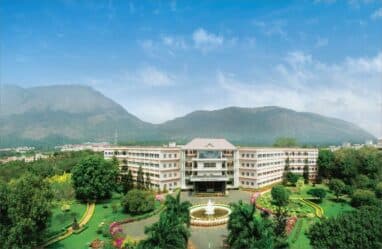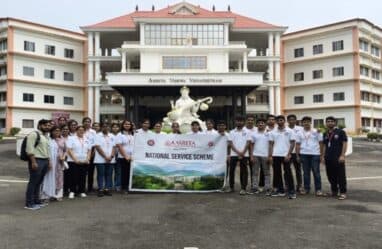Top 10 Career Options After MBA
Top 10 Career Options After MBA
After completing an MBA degree, individuals have a wide range of career options after MBA available to them. The Master of Business Administration (MBA) is a versatile degree that prepares graduates for leadership roles in various fields such as finance, marketing, operations, human resources, and more. Also read about the Top 10 Career Options for Students who are Good In Maths.


1. Management Consultant
The first option, on the list of Top 10 Career Options After MBA is Management consultants are professionals who work with organizations to help improve their performance, solve problems, and achieve their objectives.
They provide expert advice and guidance to businesses and other organizations in various areas such as strategy, operations, finance, human resources, and information technology. Management consultants work with clients to identify areas of improvement, develop recommendations, and implement solutions to achieve their desired outcomes. This is one of the best career options after MBA that most students like it.
The selection process for management consultants varies depending on the firm. Typically, management consulting firms look for candidates who have a strong academic record, relevant work experience, and exceptional problem-solving skills. Most firms require a bachelor’s degree, and some may prefer a master’s degree in business administration (MBA) or a related field.
The recruitment process for management consulting firms typically involves several rounds of interviews, including behavioural and case interviews. Behavioural interviews assess the candidate’s skills, experiences, and competencies, while case interviews evaluate the candidate’s ability to analyze complex business problems and provide actionable solutions.

2. Investment Banker
Next, on the list of Top 10 Career Options After MBA is An investment banker a financial professional who helps businesses and organizations raise capital by underwriting and selling securities, such as stocks and bonds. Investment bankers also advise clients on mergers and acquisitions, provide financial analysis, and develop strategies to achieve their financial goals.
The selection process for investment banking typically involves several rounds of interviews and assessments. The first round may involve a phone interview or online test to assess the candidate’s knowledge of finance and accounting. This is one of the best career options after MBA that most students like it.
The next round may include a series of in-person interviews with senior bankers, where candidates may be asked to solve case studies and present their ideas on business issues. The final round may involve interviews with the firm’s management team.

To become an investment banker, a bachelor’s degree in finance, economics, accounting, or a related field is typically required. Many investment bankers also have a Master’s in Business Administration (MBA) degree. Relevant work experiences, such as internships or entry-level positions in finance or banking, can also help secure a job in investment banking.
3. Marketing Manager
The list of Top 10 Career Options After MBA also has an A Marketing Manager responsible for developing and implementing marketing strategies to promote a company’s products or services and increase sales.
They conduct market research to identify customer needs, preferences, and trends and use this information to develop marketing campaigns that target specific audiences. To become a Marketing Manager, most employers require a bachelor’s degree in marketing, business administration, or a related field, along with relevant work experience in marketing or sales. Some employers may also prefer candidates with a master’s degree in marketing or a related field.
The selection process for a Marketing Manager typically involves several rounds of interviews, including phone and in-person interviews. Employers will assess a candidate’s knowledge of marketing concepts, experience in developing and implementing marketing strategies, and skills in market research, advertising, and branding. This is one of the best career options after MBA that most students like it.

Candidates should be able to demonstrate strong leadership skills, effective communication, and the ability to work in a fast-paced, deadline-driven environment. They should also have a strong understanding of digital marketing and social media, as these are becoming increasingly important in today’s marketing landscape.
4. Human Resource Manager
The list of Top 10 Career Options After MBA also has A Human Resource (HR) Manager responsible for managing the recruitment, development, and retention of a company’s employees.
The role involves overseeing all HR-related activities, including recruitment and selection, employee engagement, performance management, compensation and benefits, employee relations, training and development, and legal compliance. This is one of the best career options after MBA that most students like it.

- Screening: The first step is to screen resumes and applications to determine if the candidate has the necessary skills and qualifications for the position.
- Interviews: The candidate is then interviewed by HR representatives and hiring managers to assess their skills, experience, and fit for the role.
- Assessments: Some companies may also administer assessments, such as personality tests, to evaluate the candidate’s fit with the company culture and job requirements.
- Reference checks: The candidate’s references are checked to verify their employment history, qualifications, and work ethic.
Job offer: If the candidate is deemed a good fit, the company will extend a job offer with details on salary, benefits, and other relevant information.
To become an HR Manager, candidates typically need a bachelor’s degree in Human Resource Management or a related field. Some companies may also require a master’s degree or professional certification in HR.
Relevant skills for the role include strong communication, organizational, and leadership skills, as well as a deep understanding of HR laws and regulations. Experience in HR, recruiting, or related fields is also highly valued by employers. This is one of the best career options after MBA that most students like it.
5. Financial Analyst
Next, on the list of Top 10 Career Options After MBA is Financial analysts are professionals who analyze financial data and provide investment advice to clients. They evaluate investment opportunities, conduct market research, assess economic trends, and help clients make informed investment decisions. Financial analysts may work for investment firms, banks, insurance companies, or other financial institutions.
The selection process for financial analysts typically involves a bachelor’s degree in finance, accounting, economics, or a related field. Relevant certifications, such as the Chartered Financial Analyst (CFA) designation, may also be required or preferred by some employers.
To become a financial analyst, candidates must possess strong analytical skills, attention to detail, and the ability to work with complex financial data.
6. Operations Manager
The list of Top 10 Career Options After MBA also has An operations manager responsible for overseeing the production, quality control, logistics, and customer service aspects of a business. They work to ensure that the company’s products or services are produced efficiently, delivered on time, and meet or exceed customer expectations. This is one of the best career options after MBA that most students like it.
The selection process for operations manager typically involves several steps, including:
- Education and Experience: Most employers require a bachelor’s degree in a related field, such as business administration, engineering, or operations management. Relevant work experience is also usually required, and some employers may prefer candidates with a master’s degree.
- Skills and Abilities: Operations managers should have strong leadership and communication skills, as well as strong problem-solving and decision-making abilities. They should also be able to work well under pressure and have strong attention to detail.
- Interview: The interview process for an operations manager position typically involves multiple rounds of interviews with different individuals, such as human resources staff, senior managers, and other department heads. During the interview, candidates may be asked to discuss their experience managing teams, their approach to problem-solving, and their familiarity with the company’s industry and products.
- Assessment: Some employers may also require candidates to complete assessments or tests, such as personality assessments or skills tests, to help evaluate their fit for the position.
- Background Check: Once a candidate is selected, the employer may conduct a background check to verify their education, employment history, and criminal record.
7. Business Development Manager
The first option, on the list of Top 10 Career Options After MBA is A Business Development Manager (BDM) is responsible for identifying new business opportunities, developing and maintaining relationships with potential clients, and negotiating deals to increase revenue and market share for a company.

- Application: Candidates usually apply for the position by submitting their resumes and cover letter.
- Initial Screening: The hiring team reviews the applications and conducts an initial screening to shortlist candidates who meet the minimum qualifications and requirements for the position.
- Interviews: Shortlisted candidates are invited for one or more interviews to assess their skills, knowledge, and experience related to the position. Interviews may include behavioural, technical, and situational questions.
- Assessment Tests: Some companies may require candidates to take assessment tests, such as personality or aptitude tests, to evaluate their suitability for the role.
- Reference Checks: The hiring team may conduct reference checks to verify the candidate’s work history and qualifications.
Job Offer: The successful candidate is offered the job, and negotiations may occur to finalize the employment terms.
To succeed as a BDM, one needs to possess excellent communication skills, an entrepreneurial spirit, and the ability to work well in a team environment. A BDM should also have a good understanding of the market, the industry, and the company’s products and services. The position requires a high degree of strategic thinking, strong business acumen, and the ability to build and maintain relationships with clients and stakeholders. This is one of the best career options after MBA that most students like it.
8. Entrepreneur
Next, on the list of Top 10 Career Options After MBA is Entrepreneurship refers to the process of creating a new business or venture, taking risks, and bringing innovation to the market. Entrepreneurs are individuals who identify new business opportunities and take the initiative to start and manage their business ventures.
The process of becoming an entrepreneur can vary depending on the individual and their business goals. However, here are some general steps that can help in the selection process:
- Identify your strengths and weaknesses: Self-awareness is essential for entrepreneurship. Identify your skills, experience, and knowledge that you can leverage to start and grow a business. Also, identify your weaknesses and consider ways to overcome them.
- Identify business opportunities: Look for market gaps or unmet needs that you can address through your business venture. Conduct market research to identify consumer preferences, market trends, and competitor activities.
- Develop a business plan: Create a detailed business plan that outlines your business goals, target market, products or services, marketing strategy, financial projections, and other relevant information. Explore various funding options, such as loans, grants, venture capital, and crowdfunding.
- Launch and manage your business: Once you have secured funding, launch your business and manage its operations. Continuously monitor your business performance and make necessary adjustments to ensure its success.
Becoming a successful entrepreneur requires a combination of skills, experience, knowledge, and hard work. It is essential to have a strong vision, adaptability, resilience, and a willingness to take calculated risks. This is one of the best career options after MBA that most students like it.
9. Supply Chain Manager
The second last option, on the list of Top 10 Career Options After MBA is A Supply Chain Manager is responsible for overseeing the entire supply chain process, from sourcing raw materials to delivering the finished product to customers.
They must ensure that the supply chain operates smoothly, efficiently, and cost-effectively while meeting customer demands and maintaining high levels of quality. The role of a Supply Chain Manager can vary depending on the size and complexity of the organization they work for.
However, some of the typical responsibilities of a Supply Chain Manager include:
- Developing and implementing supply chain strategies that align with overall business goals and objectives.Developing and maintaining inventory management systems to ensure adequate stock levels are maintained.
- Managing and optimizing transportation and logistics processes to ensure timely delivery of goods.
- Identifying and mitigating supply chain risks, such as disruptions to the supply chain due to natural disasters, political instability, or other factors.
- Analyzing data to identify trends and patterns, and using this information to make informed decisions about supply chain operation
To become a Supply Chain Manager, you typically need a bachelor’s degree in supply chain management, business, engineering, or a related field. Many employers also prefer candidates with a master’s degree or professional certifications, such as the Certified Supply Chain Professional (CSCP) or the Certified in Production and Inventory Management (CPIM). This is one of the best career options after MBA that most students like it.
The selection process for a Supply Chain Manager can vary depending on the employer, but it typically involves submitting a resume and cover letter, completing an initial phone or video interview, and participating in one or more rounds of in-person interviews. Employers may also require candidates to complete assessments or tests to evaluate their knowledge and skills related to supply chain management.
10. Information Technology Manager
Last but not least, on the list of Top 10 Career Options After MBA is An Information Technology (IT) Manager who is responsible for overseeing the planning, implementation, and maintenance of an organization’s information technology systems, including hardware, software, and network infrastructure. They ensure that these systems are efficient, secure, and aligned with the organization’s goals and needs. This is one of the best career options after MBA that most students like it.

Here are the key responsibilities of an IT Manager:
- Overseeing the installation, configuration, and maintenance of computer hardware, software, and network infrastructure
- Managing IT projects and ensuring they are delivered on time, within budget, and meet quality standards
- Ensuring that data and systems are secure, and implementing appropriate security measures
- Developing and implementing IT policies and procedures to ensure compliance with relevant regulations and standards
- Managing the IT team and providing coaching and guidance to team members in identifying and evaluating new technologies and solutions that could benefit the organization.
Also read: Best Global Universities For Engineering
Conclusion
An MBA degree can lead to a variety of exciting career options after MBA across various industries. Individuals with an MBA degree possess valuable skills and knowledge that are highly sought after by employers.
With the right skills and experience, individuals can excel in their chosen careers and achieve their professional goals. This list talks about the best career options after MBA that students can go for it.
Prakhar is a tech enthusiast with a robust background in machine learning and data science. His passion lies in converting intricate technical concepts into engaging content. During his free time, he immerses himself in reading, keeping abreast of the latest tech trends and global events, which nourishes his creativity and positions him at the forefront of innovation. Through his content, Prakhar aims to inspire others to embark on their own journeys while staying informed about the ever-evolving world of technology and beyond.






